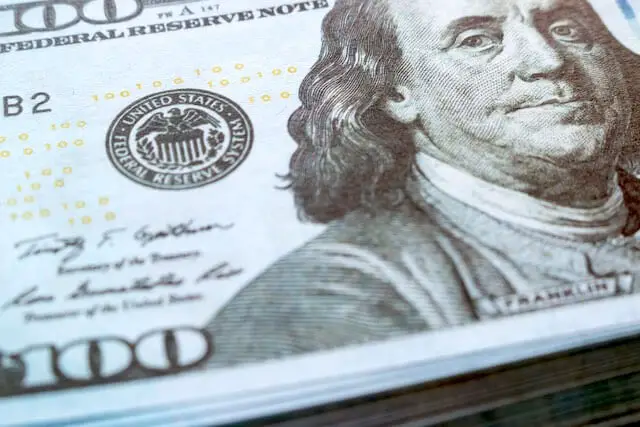Legislation has been introduced in Congress that would set the 2024 federal pay raise at 8.7%.
Before federal employees get too excited when they see this number, it is important to know that this is an annual tradition among the lawmakers who introduce the bill each year. It has never become law and the federal pay raise has wound up being lower as it meanders through the usual political process each year, but it does serve to kick off the annual political process for setting the pay raise for federal employees.
Congressman Gerry Connolly (D-VA) and Senator Brian Schatz (D-HI) introduced the Federal Adjustment of Income Rates (FAIR) Act again this year to give federal employees a higher pay raise than what they would likely otherwise get. The bill would set the overall average 2024 federal pay raise at 8.7%.
According to the terms of the legislation, the base pay raise for federal employees would be 4.7% and the increase for locality pay would be 4% thereby totaling 8.7%.
Inflation has been raging for the past two years, so presumably the figure in the bill is based on that. The 2023 COLA (cost of living adjustment) for federal retirees and Social Security recipients ended up being 8.7%, so this likely is where the 8.7% number came from.
The inflation rate for the prior 12 months at the end of 2022 came in at 6.5%, considerably less than where it was earlier in 2022. Given the downward trend in inflation, the 2024 COLA will presumably be less than the 2023 COLA, but that will not be known for certain until October.
In a statement about the bill, Schatz said, “Whether inspecting our food, conducting medical research, or caring for our veterans, federal workers play an important role in our everyday lives and deserve pay which reflects tha. After years of pay freezes, our bill gives these dedicated public servants a much-deserved raise.”
Connolly added, “They [federal employees] were subjected to the Trump Administration’s cruel personal attacks, unsafe work environments, pay freezes, government shutdowns, sequestration cuts, furloughs, and mindless across-the-board hiring freezes. Still, our federal workforce serves with dedication and distinction every day. Federal employees are our government’s single greatest asset, and they deserve better. The FAIR Act is a critical step toward recognizing their contributions and providing fair and just compensation.”
Apparently the pay freezes Schatz and Connolly are referring to in their statements are the proposed pay freezes in 2019 and 2020 by the Trump administration. However, Congress ultimately enacted pay raises in both years. During the Trump administration, the pay raises were 1.9%, 1.9%, 3.1% and 1% in 2018, 2019, 2020, and 2021, respectively. The last time federal employees received no pay raise at all was during the Obama administration from 2011-2013.
Past Versions of the FAIR Act
As noted previously, the legislation has been introduced a number of times in the past.
Last year, the bill would have set the 2023 federal pay raise at 5.1%. The final pay raise for 2023 ended up being 4.6%.
The year before that, the FAIR Act would have set the 2022 federal pay raise at 3.2%; it wound up being 2.7%. In 2020, the FAIR Act offered a 3.5% pay raise for federal employees in 2021; the final 2021 federal pay raise was 1%.
In all likelihood, the same scenario will unfold again this year, that being that the final 2024 federal pay raise is less than what Schatz and Connolly are proposing, but we won’t know for certain until December.
How is the Annual Federal Pay Raise Determined?
The annual pay raise for federal employees is determined by a political process. This means that the amount of the pay raise, if there is one, will vary from year to year depending on the political climate. This is what makes the process so complex.
In some years, Congress will pass annual federal pay rate adjustments in an appropriations bill. When this occurs, it is usually done in the Financial Services and General Government appropriations bill.
While this often happens, there is no legal requirement that a federal employee pay raise be addressed or considered by Congress. In many years, Congress does not pass legislation on the subject.
The president can, and often does, recommend a pay raise figure per the alternative pay plan. This is typically done late in the year, usually in August.
Of course, if Congress does not like the amount of the raise in the alternative pay plan, it can still pass new legislation determining the final amount. This is most likely to happen during an election year. With an election coming up, the thought process is likely to be that giving a raise = (hopefully) getting more votes for a candidate running for Congress.
After this political process has played out fully, the president issues an executive order in December setting the amount of the annual federal pay raise by locality for the next year. The Office of Personnel Management (OPM) calculates the amount of the annual salary for every locality, grade and step for the next year and publishes the pay tables shortly after the executive order is issued.
What is the Average Federal Employee Salary?
As of the end of fiscal year 2022, the average federal employee salary is now $95,279 per year according to the Office of Personnel Management.
Since 2018, the average federal employee salary has increased by a total of 11.41%, going from $85,519 at the end of fiscal year 2018 to $95,279 at the end of fiscal year 2022.





